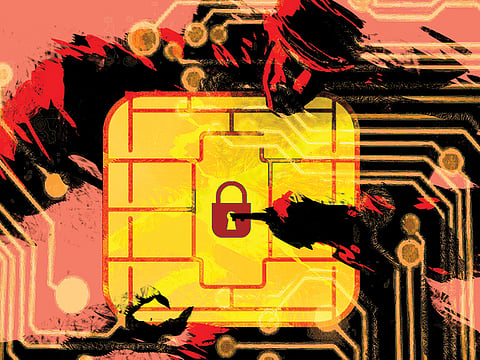The front line in war on cyber threats has moved
It is increasingly consumers in emerging markets who are coming under direct threat

If the disruptive ability of connected technology is teaching us anything, it’s that protecting our personal data is more important now than ever. The virtual worlds in which we all live, work, play and spend are exciting and convenient, but present security risks that — if taken lightly — have the potential to derail economic growth and our digital futures.
Overcoming these risks is the responsibility of everyone. From governments and industry, to regulators and consumers — together they must communicate a message that security matters, and that at every stage of our digital experience we should be cognisant of the risks.
Let’s look at online retail.
While current volumes remain moderate, e-commerce’s potential in the Middle East is well stated. Thanks to young, growing and upwardly mobile populations and one of the highest levels of smart phone penetration in the world, the UAE and other promising Middle East countries are forecast for significant growth in e-commerce.
Digital payments from both traditional cards and digital currencies will fuel that growth.
In fact, by 2020 Frost and Sullivan say the wider e-commerce industry in the region will be worth an estimated $200 billion. And much of this new wave of transactions will take place on a mobile device.
Today, there are more mobile devices on the planet than there are people. According to the GSMA tracker 1, there are around 7.4 billion mobile devices versus 7.2 billion people noted by the World Population Clock 2. And while the volume is staggering, what’s equally incredible is versatility of the modern mobile device — who’d have thought 15 or even 20 years ago that we’d be using our phones to wake us up in the morning, take photos or navigate our way around foreign cities?
The fact is that consumers in Middle East are among the most data-threatened in the world. Hackers and fraudsters have shifted their attention from established, western markets to the world’s emerging economies, where new money is driving spend and outpacing security.
Take a consumer fraud report that was published last year by ACI Worldwide. It found that of 20 countries surveyed — including India, China, the US and UK — the country with the highest percentage of respondents that reported being a victim of card fraud in the last five years, was the UAE.
This data is compounded by poor consumer confidence in the security of payment gateways in the region.
This security gap must be closed and fast if the opportunities and competitive advantage of digital payments is to be fully realised. To make the culture of cash on delivery a thing of the past, there must be consensus — and buy in — on developing a culture of safety first that allows the importance of personal data to coexist with convenience.
Realising the potential of digital payments sustainably by securing consumers’ data from an increasing threat of cyberattack benefits everyone. Show me one happy online shopping experience and I’ll show you an e-commerce adopter for life.
Part of closing this confidence gap involves vendors, retailers and payment providers in the Middle East looking to global best practice in payment security infrastructure development. Guidelines for best practices exist and are being widely deployed to ensure consumers can explore the full potential of online payments without worrying about the security of their data.
Dialogue — the type of which will take place at the Middle East Payments Forum in Dubai — will facilitate the process of best practice adoption and help drive continued action on the issue.
What’s promising is that on many fronts progress is being made. Global standards are now in place that if adopted and adhered to, provide a comprehensive security framework for organisations.
Technologies such as the EMV chip — widely adopted in the region — have been proven to reduce card misuse in a face-to-face environment adding a critical layer of security to card payments. And tokenization is providing a mechanism to devalue card data if it is stolen.
Taken together, this security is having a hugely positive effect on economic activity. Despite a tough global economic landscape, the increased use of payment cards has helped to increase consumer consumption and added to GDP.
But the future is digital. And with so much impacting the security of digital payments and the rise of sophisticated cyber criminals, not a day should go by without the industry considering the validity of better online payment security.
The writer is the International Director of the PCI Security Standards Council.



